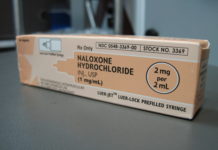Scroll through Instagram, Facebook or Twitter, maybe a watch a little TV this time of year, and it’s easy to get the impression that the holiday season, at least for everyone else, is the most wonderful, magical time ever. The “happiest of holidays” hard sell is, of course, nothing new, but it’s important to point out that for many people, the pomp, circumstance and celebration can cause stress, anxiety and strain.
In one survey, reports the New York Post, 49 percent of respondents admitted that the holidays are the most stressful time of the year.
The most obvious, and easily discussed, holiday stressors are things like a lack of finances, hosting or attending parties, finding the right gifts for people, overindulging in food and drink or having to travel on crowded planes and highways. However, there is a darker, less openly talked about aspect of the holidays for people in sobriety.
Perhaps some of the most vulnerable to “festive stress” are the newly sober, those who have not be in recovery from an addiction to drugs or alcohol very long and are trying to navigate a whole new lifestyle while everyone else around them are, seemingly, having no troubles at all.
Here are 3 tips for people new to sobriety and their advocates on how to maintain recovery during the holiday season:
Visiting family and friends, or spending time with coworkers at holiday office functions, might be a heartwarming prospect for most people, but it can feel like walking into the lion’s den for someone struggling with sobriety and addiction. It’s not uncommon to have unresolved issues with loved ones that can trigger a stress response or revisiting one’s old “stomping grounds” and re-experiencing patterns of negative thought that drive risky behavior.
Tip #1: A supportive family member or friend can make all the difference in these kinds of situations. If you’re an advocate, one way to show solidarity for a person in recovery is to remain sober alongside them. Sit next to them at dinners or be their wing-person at parties. Lend an ear if they need to talk or check in with them if they seem like they’re having a difficult moment.
Though it might seem uncomfortable at first, don’t be afraid to ask a supportive family member or friend to be your advocate if no one offers. Simply tell them how they can support you best. You might be surprised how willing they are to help.
In the absence of an advocate, have someone you can call if the need arises. This might be another friend in recovery or someone else that understands your specific challenges. Plan this ahead of time and, if appropriate, offer to be that person for them as well.
Tip #2: Don’t be afraid to protect your sobriety by saying no to invitations or events that may create unnecessary stress or anxiety. Recovering from addiction is hard fought and difficult enough. So, there is no point in walking into situations that may endanger your mental health, wellbeing and sobriety. 
Obviously, saying no to family, friends or coworkers is never fun, but they might be more understanding than you think. After a little more time in recovery, it may get easier to navigate these situations, but at the outset, it’s important to put yourself first.
For those who are not in recovery, don’t be hurt or angry if a newly sober person declines your invite or decides to skip out on a holiday tradition. They are doing what’s best for their mental and physical health. You can make plans to see them after the holiday party or family event and catch up on how one another are doing.
Tip #3: Though it’s definitely one of those terms that oozes psycho-babble, “self-care” is all about maintaining a healthy physical and mental regimen. Whether you’re staying at home over the holidays or with family, carve time out for exercise. This might be a rigorous half-hour workout that zaps stress, a long, relaxing walk or anything in between. Regular exercise decreases the body’s response to stress and anxiety, which is important to maintaining a positive outlook.
Find quiet spaces to be alone and check in with how you’re feeling especially before going into crowded family functions or social events. A few minutes of mindful meditation is a good way to reconnect to your recovery goals and feel less anxious.
If you’re hosting a newly sober family member or friend, be aware that they might want to slip away for a moment to gather themselves. Try and make sure they have a place to do this, even running interference if others are looking for them. They will appreciate your understanding and support.
Managing the chaos that can come with the holiday season can seem overwhelming for anyone, but most especially people starting a new life in recovery. If that’s you, take the time to prepare and have a plan for dealing with stress and triggers. For those with friends, family members or others who are struggling to maintain their hard fought sobriety, be a supportive advocate they can lean on and feel safe with.
















